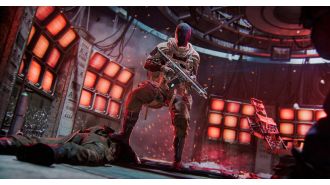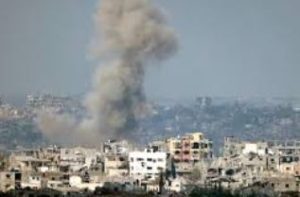Israel and Hezbollah engage in intense fighting, causing alarm in a region anticipating conflict.
Israel launched airstrikes on Lebanon, saying it was a preemptive strike on Hezbollah. The militant group responded with rockets and drones.

Early on Sunday morning, Israel launched a series of airstrikes in southern Lebanon, claiming it was a preemptive strike against Hezbollah. In response, Hezbollah announced that it had launched hundreds of rockets and drones in retaliation for the killing of one of its top commanders by an Israeli airstrike in Beirut the previous month.
Despite the heavy exchange of fire, the situation did not escalate into a full-scale war. However, tensions remain high. In an effort to ease regional tensions, Egypt is hosting high-level talks aimed at brokering a cease-fire in the ongoing 10-month conflict between Israel and Hamas in Gaza.
According to the Israeli military, the airstrikes were carried out because Hezbollah was planning to launch a large scale attack on Israel. Soon after, Hezbollah claimed to have attacked Israeli military positions in response to the killing of one of its founding members. The exchange of fire seemed to have ended by mid-morning, with both sides reporting that they only targeted military sites. However, at least three people were killed in Lebanon, while there were no reported casualties in Israel.
During a Cabinet meeting, Israeli Prime Minister Benjamin Netanyahu stated that the military had successfully neutralized thousands of rockets aimed at northern Israel. He urged citizens to follow the directives from the Home Front Command, emphasizing their determination to defend the country and retaliate against anyone who threatens them.
The situation in the region was tense, with air raid sirens and flight diversions reported in northern Israel. Ben-Gurion international airport was closed and flights were diverted for about an hour due to the threat of attack. The Home Front Command raised the alert level in northern Israel, but later lifted restrictions in most areas.
According to Lt. Col. Nadav Shoshani, an Israeli military spokesman, Hezbollah had planned to target areas in northern and central Israel. He stated that the initial assessment showed minimal damage in Israel, but the military remained on high alert. Around 100 Israeli aircraft were involved in the airstrikes on Sunday.
Lebanon's Health Ministry reported that two people were killed and two others wounded in the strikes in southern Lebanon. The Amal group, an ally of Hezbollah, also reported that one of its fighters was killed in a strike on a car.
Hezbollah claims to have launched over 320 Katyusha rockets and a "large number" of drones in the attack. They stated that their operation targeted a "qualitative Israeli military target" that would be announced later, as well as enemy sites, barracks, and Iron Dome platforms. However, they later announced that their military operations for the day had ended.
Hezbollah's leader, Hassan Nasrallah, is expected to give a speech later on Sunday. In the US, President Joe Biden is closely monitoring the situation, while the Pentagon stated that Defense Secretary Lloyd Austin had spoken with his Israeli counterpart about Israel's defenses. The chairman of the Joint Chiefs of Staff is currently on a visit to the region, which includes stops in Israel, Egypt, and Jordan.
Diplomats from the US and European countries have been making efforts to de-escalate the situation and prevent it from turning into a full-blown war. According to Randa Slim, a senior fellow at the Middle East Institute, the exchange of fire on Sunday morning was still within the rules of engagement and unlikely to lead to an all-out war at this point.
Experts believe that Hezbollah may be trying to balance the situation without escalating into war. Both sides are hoping that their actions will be seen as a victory and avoid further confrontation. The conflict between Israel and Hezbollah has been ongoing since the start of the war in Gaza, triggered by a Hamas attack on October 7th. The daily exchange of fire has displaced tens of thousands of people on both sides of the border.
Hezbollah, a close ally of Iran, is believed to be much more powerful than during the 2006 conflict with Israel. The US and Israel estimate that it has around 150,000 rockets and is capable of hitting anywhere in Israel. They have also developed drones that can evade Israel's defenses and precision-guided munitions.
However, Israel also has a strong military and a multi-tiered missile defense system, with support from a US-led coalition that has successfully intercepted hundreds of missiles and drones from Iran earlier this year. The US has been increasing its military presence in the region in recent weeks.
In the event of a full-scale war, Israel has promised a crushing response that would likely cause severe damage to critical civilian infrastructure in southern Lebanon and south Beirut, where Hezbollah's main strongholds are located. This could potentially displace hundreds of thousands of people on both sides.
Hezbollah has threatened to retaliate for the killing of one of its top commanders, along with the killing of a senior Hamas leader in Tehran last month, which was widely blamed on Israel but not confirmed. Iran's state media reported on the successful attack by Hezbollah, but there has been no official comment from Iranian officials.
The US and other mediators see a cease-fire in Gaza as crucial to prevent further escalation. Hezbollah has stated that they will stop their attacks on Israel if there is a cease-fire in Gaza. The ongoing negotiations in Cairo involve the release of hostages held by Hamas and are attended by high-level officials, including the CIA director and the head of Israel's Mossad intelligence agency. Hamas is not directly involved in the talks.
3 Views










